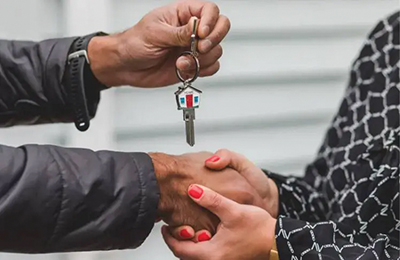
By Bria Overs – via www.westsidegazette.com – “Challenging.” That is how Courtney Johnson Rose describes the state of housing in Black America for 2023. Rose is the President of the National Association of Real Estate Brokers (NAREB), a minority professional trade organization serving real estate workers.
The rate of Black homeownership in America has never reached 50%, a level other racial and ethnic groups hit in years past. The closest the Black community has ever come to it was in early 2004 when it hit 49.7%. It has been rapidly declining in the nearly 20 years since, hitting its lowest point in early 2019 at 40.6%.
“It’s a challenge to sell real estate and to inspire people to buy real estate in this type of market,” Rose says. “Rates are high, prices are high. We’ve had buyers in my office that we’ve been looking for six months to find the right house.”
“We need to figure out new ways for Black Americans to build wealth because, in many markets, it’s very difficult to become a homeowner because of the wealth profile of Black Americans,” Andre M. Perry, senior fellow at Brookings Metro, says. “We certainly need homeownership as a vehicle to build wealth, but we need other [methods] as well.”
All is not lost, though. Rose says educating, preparing, and reforming systems to be more inclusive for potential and existing Black homeowners can help the community get there.
What Black Homeowners and Homebuyers Face
Black net worth has increased by 61% since 2019, from a median of $28,000 to $45,000. However, more money is needed to purchase a home. Providers of conventional home loans denied Black applicants three times more than white applicants. The report found that “unfavorable debt-to-income ratio, poor credit history, and inadequate collateral were the top three reasons for loan denial among Black and white prospective borrowers.”
Then there’s the housing affordability problem. According to the National Association of Home Builders (NAHB)/Wells Fargo Housing Opportunity Index (HOI), 37.4% of homes sold this summer were affordable to families earning the U.S. median income of $96,300. Most Black families do not make half of that.
Contributing to this problem are interest rates, which were raised by the Federal Reserve 11 times since March 2020 in an attempt to recover from the shock of the COVID-19 pandemic. Fortunately for borrowers, as inflation holds steady at 3.1%, the year will end with no new increases, and some reports claim the Fed may cut interest rates three or more times in the coming year. Rose hopes this news will encourage more Black Americans to enter the housing market.
Recommendations for addressing these concerns include finding new ways to tax people based on levels of wealth to account for the profiles of different racial and ethnic groups. But more importantly, guards are needed to stop racial bias, Perry says.
“We need data to examine the differences across neighborhoods, and we need systems to hold tax assessors and cities accountable,” he adds.
“Because as long as there are subjective approaches to valuing these assets, there’s going to be the risk of discrimination.” ANDRE M. PERRY, SENIOR FELLOW AT BROOKINGS METRO
Black millennials are the future of homeownership. The NAREB reported the group accounting for the most significant generational share of mortgage loans in 2022. Yet, their homeownership rate is only half that of white millennials, and is at risk of declining because of systemic obstacles and the economy.
“Student loan debt is one of the biggest impediments they have for being able to purchase real estate,” Rose says. “A lot of them went to college, which was the right thing to do, but for the first 15 years out of college, they’re paying off the debt they spent to get their education.”
To provide opportunities for education and advancement, NAREB kicked off its multi-city Black Wealth Tour, making stops in Houston and Birmingham earlier this year. The tour will visit Atlanta, Little Rock, Los Angeles, and other cities in 2024.

Be the first to comment